Moulkheir Mint Yarba tends goats in the Sahara Desert and works long hours in the sun for little to no pay. Yarba constantly fears the prospect of rape and on one day, upon returning home, she found that her master had left her young infant out in the sun to die. Following the death of her child, she requested a break from her work to bury her child. Her master denied the request and immediately required Yarba to return to work. When one listens to Yarba’s story, one calls to mind the experiences of slaves in the Antebellum South. Yet, Yarba did not live in 1850’s Alabama. Yarba’s story comes to us from Mauritania today.
More than thirty years after its official abolition, slavery remains deeply rooted in Mauritania’s culture. According to Gulnara Shahinian, the UN’s special rapporteur on slavery, slaves constitute 10% to 20% of Mauritania’s population. While Mauritania abolished slavery in 1981 and criminalized it in 2007, rates of slavery still remain high. Ineffective law enforcement partly causes this problem. Despite laws against slavery, there has been only one successful prosecution. However, while one should recognize law enforcement’s failures, larger cultural issues contribute more to slavery’s legitimization.
The problem starts with laws prohibiting the discussion of slavery’s existence. When questioned about slavery, Brahim Ould M’Bareck Ould Med El Moctar, the minister of rural development, responded that, “All people are free in Mauritania and this phenomenon (of slavery) no longer exists.” Indeed, the government dedicates resources to prevent the discussion of slavery in the Western press. When journalists from CNN interviewed anti-slavery activists, they were compelled to conduct their interviews secretly because otherwise, a government minder from the Ministry of Communications would monitor discussions to prevent the mentioning of slavery. Indeed, anti-slavery activists report that they have been arrested and tortured for their work. Consequently, slavery denialism’s prevalence has prevented resistance to slavery.
Moreover, the politicization of Mauritania’s census undermines measurements of the number of people enslaved. Erin Pettigrew, professor of history and Arab crossroads studies at NYU Abu Dhabi, notes that even as the government conducts a census for the first time in decades, certain groups such as the Haratin, Soninke, Wolof, and Pular believe that the government has done everything possible to prevent their participation in the census. This systematic exclusion from the census explains the disparity in the estimates of the number of slaves. While the Global Slavery Index claims that the enslaved population amounts to 43,000, SOS slavery puts the number at 600,000. Because Haratins claim descent from slaves, the political nature of the census has undermined anti-slavery activists’ attempts to accurately measure the slave population’s size.
Furthermore, neither racial discrimination nor the historical model of chattel slavery defines slavery in Mauritania. While Mauritanian slavery has racial aspects, those racial aspects lack the importance that they possessed in the context of American chattel slavery. Historically, both Arab-appearing people and people who would appear black to Americans have owned black slaves. As a result, while slavery’s victims were from a single racial group, slavery’s beneficiaries have come from multiple racial backgrounds. This fact challenges the conception that racial discrimination necessarily plays a role in all aspects of slavery since some blacks benefitted from slavery. Mauritanian anti-slavery activism cannot indict slavery through appeals to the practice’s racism. Rather, challenges must start with the unethical nature of coerced labor.
Indeed, the trans-Saharan slave trade’s historical legacy explains the contemporary immunity of those of Arab descent from slavery. Since the 8th century, human traffickers have brought people across the Sahara to North Africa and often into Europe. With the growth of Arab socio-economic and political power over Mauritania and the rest of the region, Arabs gained the power to enslave other racial groups. Pettigrew notes that enslavement was justified on religious grounds. Arab slavers argued that people from the lands south of the Sahara were not sufficiently pious in their Muslim faith. Even today, supporters of slavery popularly use such appeals in Mauritanian political discourse to support slavery’s perpetuation.
Simultaneously, Mauritanian slavery does not fit the American model of slavery. When Americans think of slavery, they think of chattel slavery, where masters physically purchase slaves and slaves work on plantations. Americans understand slavery in terms of hard coercion, where masters physically prevent slaves from leaving with brutal force if necessary. In contrast, Pettigrew notes that soft coercion informs the features and logic of Mauritanian slavery. In Mauritania, relationships between slave and master lack reciprocity, but do not always involve the physical force constitutive of chattel slavery. Mauritanian slaves enter into such unfair relationships voluntarily. However, they do not receive a living wage or humane working conditions or regular payment. High rates of unemployment supercharge this problem by causing slaves to lack alternatives. Even with a massive slave population, Mauritania’s unemployment rate hovers around 12 percent. Anti-slavery activists must answer the complicated question of what to do with slaves in the absence of slavery. Thus, because of the difficulty of recognizing the soft coercion of Mauritanian slavery, law enforcement faces challenges in prosecuting slave owners.
Similarly, because one cannot articulate the immorality of Mauritanian slavery in terms of race, the international community has not pressured Mauritania to end the practice. Even as labor unions such as the AFL-CIO, the American Federation of Labor, and the Congress of Industrial Organizations have called for the removal of Mauritania from the group of countries that benefit from the African Growth and Opportunity Act, the U.S. has still refused to forbid Mauritania from benefitting from the Act. The Act allows African countries that uphold human rights to export goods duty-free to U.S. markets. As a result, the U.S. has lacked the courage to hold the Mauritanian government accountable.
Yet, even as the horrifying condition of slavery persists in Mauritania, anti-slavery activists should focus on the systemic factors that incentivize slavery and not on particular individuals’ character. When faced with norms that support slavery’s proliferation, Mauritanians may find it difficult to reject the culture of slavery. Challenges cannot center on the immorality of slave owners. Rather, the anti-slavery movement must focus on the legal and cultural factors that render slavery all but inevitable. Additionally, since discussion of slavery’s immorality is functionally illegal in Mauritania, learning about the arguments against slavery’s permissibility has become difficult. Campaigns against slavery must be careful to demonize legal and cultural systems that legitimize oppression and not particular individuals within those structures of power.
Overall, various factors coalesce to facilitate Mauritanian slavery’s continuation. While the Mauritanian government’s failure to enforce anti-slavery laws has played an important role, prohibitions on the topic’s discussion, the census’s politicization, and the fact that Mauritanian slavery does not fit traditional models of coercion have all contributed to the practice’s maintenance as well. If anti-slavery activists desire to end the practice, they will need to design their strategies with a full understanding of the problem. With an understanding of the complexity of slavery in Mauritania, activists can move forward to challenge not just the laws that support human bondage, but also the cultural norms that allow for coercion.
Featured image source: CNN Freedom Project






Be First to Comment